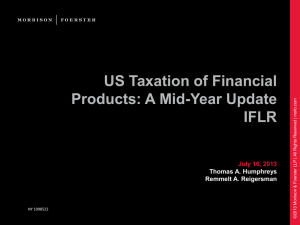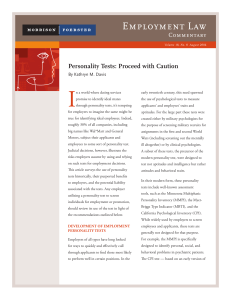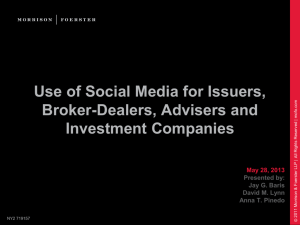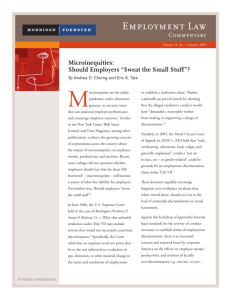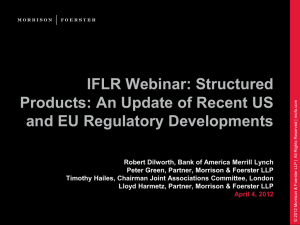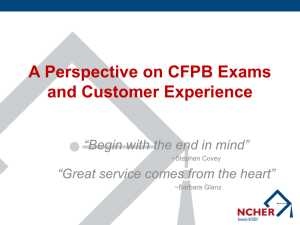financial services report
advertisement
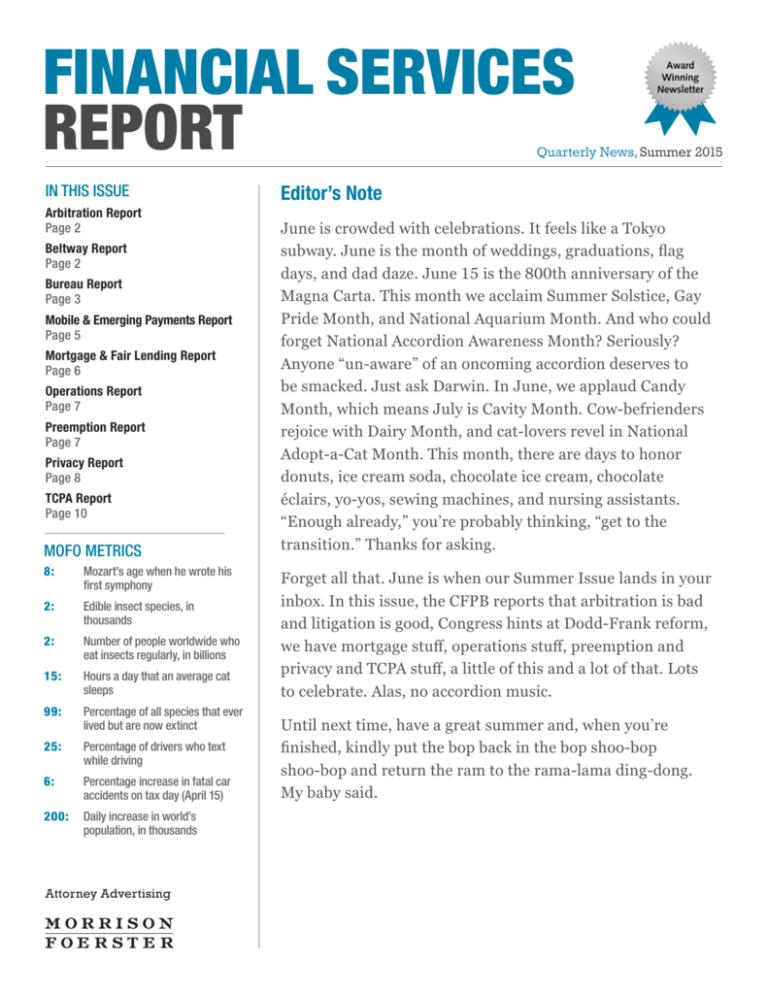
FINANCIAL SERVICES REPORT Award Winning Newsletter Quarterly News, Summer 2015 IN THIS ISSUE Arbitration Report Page 2 Beltway Report Page 2 Bureau Report Page 3 Mobile & Emerging Payments Report Page 5 Mortgage & Fair Lending Report Page 6 Operations Report Page 7 Preemption Report Page 7 Privacy Report Page 8 TCPA Report Page 10 MOFO METRICS 8: Mozart’s age when he wrote his first symphony 2: Edible insect species, in thousands 2: Number of people worldwide who eat insects regularly, in billions 15: Hours a day that an average cat sleeps 99: Percentage of all species that ever lived but are now extinct 25: Percentage of drivers who text while driving 6: Percentage increase in fatal car accidents on tax day (April 15) 200: Daily increase in world’s population, in thousands Attorney Advertising Editor’s Note June is crowded with celebrations. It feels like a Tokyo subway. June is the month of weddings, graduations, flag days, and dad daze. June 15 is the 800th anniversary of the Magna Carta. This month we acclaim Summer Solstice, Gay Pride Month, and National Aquarium Month. And who could forget National Accordion Awareness Month? Seriously? Anyone “un-aware” of an oncoming accordion deserves to be smacked. Just ask Darwin. In June, we applaud Candy Month, which means July is Cavity Month. Cow-befrienders rejoice with Dairy Month, and cat-lovers revel in National Adopt-a-Cat Month. This month, there are days to honor donuts, ice cream soda, chocolate ice cream, chocolate éclairs, yo-yos, sewing machines, and nursing assistants. “Enough already,” you’re probably thinking, “get to the transition.” Thanks for asking. Forget all that. June is when our Summer Issue lands in your inbox. In this issue, the CFPB reports that arbitration is bad and litigation is good, Congress hints at Dodd-Frank reform, we have mortgage stuff, operations stuff, preemption and privacy and TCPA stuff, a little of this and a lot of that. Lots to celebrate. Alas, no accordion music. Until next time, have a great summer and, when you’re finished, kindly put the bop back in the bop shoo-bop shoo-bop and return the ram to the rama-lama ding-dong. My baby said. ARBITRATION The Other Shoe Drops The CFPB released its longawaited Report to Congress on arbitration agreements in consumer financial contracts. The Report’s conclusion, and Director Richard Cordray’s remarks, were as expected: that consumers are better served by litigation— and particularly, class action litigation—than by agreements to arbitrate disputes. The Report addresses nine key areas, including the prevalence and features of arbitration agreements, consumer understanding of arbitration agreements, the types and resolutions of claims in arbitration and in court, and the value of class action settlements. Although the Report comes in at over 700 pages, the CFPB recognized that it lacked sufficient information to evaluate several critical areas. Want to know more? Read our Client Alert. For more information, contact James McGuire at jmcguire@mofo.com or Nancy Thomas at nthomas@mofo.com. Like Oil and Water Another court has considered the interplay between the Bankruptcy Code and the Federal Arbitration Act, this time in a case about a payday loan servicer’s proof of claim. Moses v. CashCall, 781 F.3d 63 (4th Cir. 2015). Plaintiff filed for bankruptcy, and the servicer CashCall filed a proof of claim. Plaintiff then filed an adversary proceeding (1) seeking a declaratory judgment that the loan was void and (2) asserting a claim for violation of a state debt collection statute. CashCall moved to withdraw its proof of claim or, in the alternative, to compel arbitration. The court affirmed the lower courts’ conclusion that plaintiff’s declaratory judgment claim was a constitutionally core 2 Financial Services Report, Spring 2015 claim under the Bankruptcy Code, so sending that claim to arbitration would “inherently conflict with the Bankruptcy Code’s purposes.” Id. at 72. However, the court reversed the lower courts’ refusal to send the debt collection claim to arbitration because the claim was not a constitutional core claim and its connection to the core declaratory judgment claim was too attenuated to overcome the presumption in favor of arbitration. For more information, contact Mike Miller at mbmiller@mofo.com. BELTWAY You Sue Me, I’ll Sue You On April 17, 2015, Quicken Loans Inc. filed suit against the DOJ and HUD. See Quicken Loans Inc. v. United States, Case No. 2:15cv-11408 (E.D. Mich.). Quicken asserts that despite being ranked the highest-quality lender issuing FHA-backed loans, the company has been unfairly subject to a lending practices investigation for more than three years. As part of that investigation, Quicken, the largest FHA lender, alleges that it has been subject to intimidation and threats from the DOJ and HUD’s inspector general. Quicken claims to be a target of a political agenda under which the DOJ is “investigating” and pressuring large, high-profile lenders into paying nine- to ten-figure sums and publicly “admitting” wrongdoing. Not to be outdone, the following week DOJ sued Quicken under the False Claims Act for allegedly improperly underwriting mortgages and reaping the benefits of Federal Housing Administration insurance payouts. See United States v. Quicken Loans Inc., Case No. 1:15-cv-00613 (D.D.C.). For more information, contact Joe Rodriguez at jrodriguez@mofo.com. Operation Choke Point Marches On The DOJ recently reached its third bank settlement under Operation Choke Point, agreeing with Plaza Bank of Irvine, California, on a $1.225 million deal for the bank’s alleged failure to report a payment processor’s relationship with fraudulent merchants. The Justice Department alleged that top executives at Plaza Bank were also investors in a third-party processor that worked with fraudulent merchants to take unauthorized withdrawals from consumer accounts between July 2007 and mid-2010. The bank allegedly did not end the relationship even though approximately half of the debits made through the processor were rejected by customers’ banks and the bank received hundreds of consumer warnings. Further, the bank’s chief operating officer allegedly brushed aside concerns raised by the top compliance officer around some of these activities without acknowledging the conflict of interest. See United States v. Plaza Bank, Case No. 1:15-cv-00394 (C.D. Cal. filed Mar. 12, 2015). For more information, contact Ollie Ireland at oireland@mofo.com. Watch Those Check Registers The FDIC is looking at implementing new recordkeeping standards for a limited number of FDIC-insured institutions with a large number of deposit accounts. In its ANPR, the FDIC seeks feedback on ways to strengthen deposit account recordkeeping requirements and administration at institutions with a large number of deposit accounts. The ANPR includes a number of additional topics for consideration, such as what types of new data requirements would benefit a rapid and efficient insurance determination process and the threshold size or type of institutions continued on page 3 that would be subject to potential new requirements. The deadline for comments is July 27, 2015. For more information, contact Ollie Ireland at oireland@mofo.com. Regulatory Relief Redux A bill that would bring changes to the financial regulatory system passed out of the Senate Banking Committee on Thursday with only Republican support, but Democrats indicated some areas where they may be able to find common ground as negotiations continue. The Financial Regulatory Improvement Act of 2015, introduced by Banking Committee Chairman Richard Shelby, R-Ala., moved out of committee on a party-line 12-10 vote. The Shelby bill is widely seen as the most extensive overhaul of the financial system since the DoddFrank Act. Among other things, the bill would ease regulations on community banks and credit unions, broaden the Dodd-Frank exemptions for smaller banks, and make several changes to the Federal Reserve. For more information, contact Joe Rodriguez at jrodriguez@mofo.com. BUREAU Can You Hear Me Now? On May 12, 2015, the CFPB filed proposed consent orders in federal courts that would settle allegations that two wireless carriers unfairly permitted their customers to be charged by establishing billing and processing systems that enabled third-party merchants to bill consumers for unauthorized purchases. The CFPB initially brought suit in December against one carrier, but in a significant new development, the CFPB filed suit and a proposed related consent order involving a second carrier. The alleged UDAAP violations are significant, as these cases are among the first instances where the CFPB 3 Financial Services Report, Spring 2015 has taken action against companies that, prior to the enactment of the Consumer Financial Protection Act, were not traditionally subject to the enforcement authority of federal financial regulators. Specifically, the CFPB alleged that the carriers extended credit to, and processed payments for, consumers and therefore are “covered persons” under the Consumer Financial Protection Act. For more information, read our client alert or contact Obrea Poindexter at opoindexter@mofo.com. $19.4 Million Returned to Consumers, with Nary a Press Release Although it seems like the CFPB announces a new consent order nearly every day, the Bureau isn’t always in it for the glory. Sometimes, even though an examination reveals violations of law, the Bureau does agree to forgo public enforcement in favor of non-public supervisory actions to resolve the violations. In the most recent issue of Supervisory Highlights, the CFPB disclosed that non-public supervisory actions involving companies that were found to have violated federal consumer protection laws had resulted in $19.4 million in monetary relief to more than 92,000 consumers in the second half of 2014. Of course, the $19.4 million returned to consumers via non-public action is small compared to the hundreds of millions the Bureau claimed in public restitution last year, but it’s not clear whether that means the Bureau is more likely to seek solely behavioral changes in supervisory actions, or just doesn’t opt for the non-public route that often. For more information, contact Nancy Thomas at nthomas@mofo.com. Reg Z Disclosures in 140 Characters or Less #goodluck Speaking of Supervisory Highlights, Supervision’s post-exam observations for the second half of 2014 ran the gamut, from compliance with the Title XIV mortgage origination rules, to ECOA, to FDCPA violations in student loan collections, to overdraft fee disclosure practices. One of the more interesting mortgage origination observations was that institutions were not subjecting social media advertising to monitoring or compliance audit. According to Supervision, loan originators advertised the length of payment, amount and number of payments, and finance charges on social media without providing disclosures required under Regulation Z. You can fit all those disclosures into 140 characters or less, right? For analysis of this observation and the other juicy tidbits from Supervisory Highlights, check out our blog post “Winter 2015 Supervisory Haiku-lights.” For more information, contact Jessica Kaufman at jkaufman@mofo.com. Credit Card Market Review, Round Two In March, the CFPB announced a “Request for Information Regarding Credit Card Market.” It follows the 2009 CARD Act’s requirement that the CFPB conduct a review of the consumer credit market every two years. This second time around, the Bureau is focused on revisiting some familiar topics, including the continuing effect of the CARD Act on the credit card market; addon products; rewards; deferredinterest products; fee harvester cards; online disclosures; and grace periods. But the review will also explore a couple of new “areas of interest”—debt collection practices, including supervision of thirdparty debt collectors; and ability to pay implementation. The request signals the Bureau’s continued focus on potential UDAAP and ECOA violations by lenders, particularly with respect to newer products, as well as its increasing attention to debt collection issues. continued on page 4 For more information, read our Client Alert or contact Obrea Poindexter at opoindexter@mofo.com. Narrative Consumer Complaints Are Happening Despite apparent impracticalities, the CFPB has moved ahead with its plan to allow consumers submitting complaints to its Consumer Complaint Database to go public with narrative descriptions of their complaints. On March 19, the Bureau announced the change and encouraged consumers to “lift their voices” into a potentially cacophonous chorus that could pose reputational challenges for consumer financial services companies. During the comment period, industry commenters pointed out that the narratives would be unverified even though they posed great potential reputational risk, and that privacy law restrictions meant there was no practical way for companies to respond to narrative complaints with a narrative. The Bureau’s response? In short: too bad. The Bureau says its limited verification protocol, which includes confirming that a commercial relationship exists between the consumer and the company identified and that the complaint is submitted by the identified consumer or his or her authorized representative, is enough to keep complaints honest. And although the Bureau acknowledges that “unstructured company narratives may not effectively provide companies with a mechanism to balance a consumer’s narrative,” it thinks it can solve that problem by permitting companies to choose from “a finite list of optional structured responses” to each complaint. For more information, contact Angela Kleine at akleine@mofo.com. CFPB Outlines Approach to Payday Loan “Debt Traps” The long march toward payday loan regulation continues. At a 4 Financial Services Report, Spring 2015 field hearing on March 26, the CFPB outlined the proposal it is considering to regulate payday lending. The proposal would cover short- and long-term payday loans, as well as vehicle title loans, deposit advance products, and certain high-cost installment and openend loans. The CFPB views these products as “debt traps,” and the proposal would “requir[e] lenders to take steps to make sure consumers can repay their loans.” In broad strokes, the CFPB’s outline provides for two different approaches to the “elimination” of “debt traps”: prevention and protection. Prevention is based on the lender determining the consumer’s ability to repay, and protection focuses on restricting product terms to ensure that consumers can affordably repay their debt. The CFPB is also considering restrictions on payment collection practices that, in the CFPB’s view, may result in excess fees for consumers. For more information, check out our blog post or contact James McGuire at jmcguire@mofo.com. CFPB Ain’t Afraid of No Ghost Debt Collectors In April, the CFPB sued the “ringleaders of a robo-call phantom debt collection operation, their companies, and their service providers,” alleging that the debt collectors, using various aliases, “allegedly deployed automated calls to threaten, harass, and deceive consumers in attempts to collect debt the consumers did not owe.” In the CFPB v. Universal Debt & Payment Solutions, LLC, et al. Complaint, the Bureau alleged that the collectors’ automated calls, placed through a telemarketer, often threatened “arrest, wage garnishment, and ‘financial restraining orders’” if consumers did not pay the debt collectors. The Bureau claims the alleged scam generated millions in fraudulently obtained payments for the individuals behind it. The Bureau also sued the debt collectors’ payment processors, asserting that these processors were liable for knowingly or recklessly providing substantial assistance to the debt collectors and for failing to “conduct reasonable due diligence to detect the unlawful conduct,” approving merchant applications that bore indicia of fraud, and ignoring warnings of fraud from payment networks and customers. For more information, contact David Fioccola at dfioccola@mofo.com. Debt Collector “Impersonating” Prosecutors The CFPB settled with another debt collector in March, this time for allegedly impersonating prosecutors, threatening criminal prosecution or jail time if consumers did not pay debts related to bounced checks. Debt collector National Corrective Group allegedly operated under contracts with state and local prosecutors’ offices to collect on bounced checks through diversion programs, and contacted debtors using letterhead from those agencies without their approval. The CFPB says doing so gave customers the false impression that prosecutors had determined the consumers were eligible for diversion programs, and “intimidated consumers into paying hundreds of dollars of extra fees to avoid potential criminal prosecution.” The proposed consent order would prohibit these practices, and impose a small $50,000 civil monetary penalty (which, the Bureau noted, would have been bigger if not for “the poor financial condition of the companies” and their principal). For more information, contact Mike Miller at mbmiller@mofo.com. CFPB to Card Issuers: Unsubscribe (for Now) In April, the CFPB announced a final rule suspending for one continued on page 5 year the requirement established under TILA and implemented by Regulation Z that credit card issuers submit their card agreements to the CFPB on a quarterly basis. During the suspension period, the CFPB will work to develop a “streamlined and automated electronic submission system” that will enable issuers to upload agreements directly to the Bureau’s online repository. Notwithstanding the final rule, issuers still must post credit card agreements on their websites. For more information, contact Obrea Poindexter at opoindexter@mofo.com or read our client alert. Military Allotment Processor Dinged for Camouflage Fees In April, the CFPB went after military allotment processor Fort Knox National Company and its subsidiary Military Assistance Company for charging servicemembers “millions of dollars in hidden fees.” Military allotments began as a way for servicemembers to deduct payments for sending money home or paying creditors before automatic bank payments and electronic transfers were common. If the servicemember unknowingly continues the deductions after a creditor is fully paid, though, residual funds can accumulate. Under a consent order with the Bureau, the two entities agreed to pay about $3.1 million to servicemembers for allegedly failing to disclose that they were charging recurring service fees for residual balances that servicemembers did not know were in their accounts. For more information, contact Leonard Chanin at lchanin@mofo.com. One-Two Punch Against Morgan Drexen Litigation between the CFPB and debt-relief services firm Morgan Drexen has been contentious for months. But in May, Morgan 5 Financial Services Report, Spring 2015 Drexen received a double blow. First, the D.C. Circuit declined to hear Morgan Drexen’s challenge to the CFPB’s constitutionality, saying that Morgan Drexen could pursue its constitutional claims in the enforcement action that is ongoing in California. Then, later that month, the trial court in the enforcement action imposed the sanction of default judgment for what the court found was deliberate falsification of evidence—namely, fake bankruptcy petitions created after the CFPB served discovery requests. The court noted that the falsification was “blatant” and that Morgan Drexen had deceived even its own trial counsel. For more information, read our blog posts, or contact David Fioccola at dfioccola@mofo.com. MOBILE & EMERGING PAYMENTS FinCEN Enforcement Action “Ripples” Through Virtual Currency Market On May 5, 2015, FinCEN assessed a civil money penalty against Ripple Labs for failing to register as a Money Services Business (MSB) with FinCEN and for allegedly failing to maintain an adequate AML program. Although FinCEN recognized that Ripple registered as an MSB and implemented an AML program back in 2013, FinCEN’s press release also stated that Ripple must look back for three years to identify suspicious transactions and make certain “enhancements” to the Ripple virtual currency protocol. FinCEN issued guidance in March 2013 that virtual currency exchanges should register as MSBs. Ripple both issued virtual currency, known as XRP, and exchanged fiat currency for XRP. For more information, contact Obrea Poindexter at opoindexter@mofo.com. Would a Token by Another Name Smell as Sweet? With all of the excitement around the additional security potential of “tokenization”—substituting a payment card number in a transaction with a randomly generated number—the Payment Card Industry Security Standards Council (PCI SSC) wishes to remind everyone that a token is not inherently secure. If a token can be easily cracked or otherwise associated with an account number, then the token will not provide any additional security. PCI SSC issued guidance on tokenization in April 2015 that provides considerations for evaluating the security and robustness of a given tokenization system. The guidance outlines best practices and evaluation procedures for various tokenization systems. For more information, contact Trevor Salter at tsalter@mofo.com. Itty Bitty Company Gets a Big Charter On May 7, 2015, the NYDFS granted a charter under the New York Banking Law to itBit Trust Company, LLC, a commercial Bitcoin exchange. Following the NYDFS approval, itBit becomes the first virtual currency company to receive a charter from NYDFS. itBit submitted its application following the NYDFS March 2014 order that initiated a process for accepting licensing applications from virtual currency exchanges under the New York Banking Law. According to its press release, the NYDFS “conducted a rigorous review of that application, including, but not limited to, the company’s anti-money laundering, capitalization, consumer protection, and cyber security standards.” itBit will now operate as a limited-purpose trust company. The requirements that apply to limited-purpose trust companies will likely be at least as stringent as those that apply to virtual currency exchange licensees. continued on page 6 For more information, contact Jeremy Mandell at jmandell@mofo.com. MORTGAGE & FAIR LENDING Fair Enough? On April 28, 2015, the CFPB issued its annual Fair Lending Report, highlighting its 2014 fair lendingrelated enforcement, supervisory, and rulemaking activities. Overall, last year’s fair lending enforcement actions resulted in $224 million worth of monetary relief for approximately 303,000 customers. The report reflects a particular focus on redlining and indirect auto lending, as well as alleged discriminatory practices in the credit card market. The Bureau reported that it referred a total of 15 potential ECOA violations to the DOJ in 2014, 10 of which the DOJ picked up and is actively investigating. For more information, contact Tom Noto at tnoto@mofo.com. Anything but Guaranteed On March 2, 2015, the Supreme Court granted cert. to decide whether the ECOA excludes certain guarantors from the definition of “applicant,” and relatedly, whether the Fed had the authority to include those guarantors as “applicants” in ECOA’s implementing regulation, Regulation B. Hawkins v. Cmty. Bank of Raymore, 761 F.3d 937 (8th Cir. 2014), cert. granted, No. 14520, 2015 U.S. LEXIS 1635 (Mar. 2, 2015). A decision by the Court could resolve a circuit court split between the Sixth and Eighth Circuits. For more information, read our client alert or contact Joe Rodriguez at jrodriguez@mofo.com. CFPB Ups the Ante in RESPA Crackdowns On April 29, 2015, the CFPB, along with the Maryland Attorney 6 Financial Services Report, Spring 2015 General, filed six proposed consent orders in its latest RESPA enforcement action. The Bureau alleges that a title company, two of its executives, and four loan officers concocted and carried out a mortgage-kickback scheme. These consent orders follow related proceedings against two national banks, which settled via consent orders requiring over $24 million in civil monetary penalties. For more information, read our client alert or contact Angela Kleine at akleine@mofo.com. April Fool’s Day – Not On April 1st, the Bureau issued updated exam procedures on the new TILA and RESPA rules. They cover TILA RESPA Integrated Disclosures (applicable for exams after the August 2015 effective date), Higher-Priced Mortgage Loan Appraisals, Escrow Accounts, and Mortgage Servicing Requirements. For additional information on the new rules and their implementation, check out our handy coverage chart and more details available on the MoFo MoFi page, as well as the Bureau’s available resources. For more information, contact Don Lampe at dlampe@mofo.com. “Payment Authorization” = “Payment”? A divided Seventh Circuit found that TILA requires mortgage servicers to credit online electronic payments on the day the customer authorizes the payment, even if the services don’t actually receive the payment at that time. Fridman v. NYCB Mortg. Co., LLC, 780 F.3d 773 (7th Cir. 2015). TILA generally requires mortgage servicers to credit payments to consumer accounts on “the date of receipt,” unless the delay has no impact on credit reporting or fees incurred. In finding that “date of receipt” of payment means date of receipt of authorization, the Seventh Circuit relied heavily on the applicable CFPB regulation. For more information, read our blog post or contact Angela Kleine at akleine@mofo.com. CFPB Keeps Sights on Military Mortgage Ads On April 9, 2015, the CFPB announced another enforcement action targeting alleged deceptive mortgage advertising to veterans. The Bureau claims that the defendant lender targeted veterans with ads that falsely implied an affiliation with the Department of Veterans Affairs or the Federal Housing Administration and that failed to disclose interest rates and monthly payment amounts. The lender agreed to pay $250,000 to settle the matter. This follows three February 2014 enforcement actions against other mortgage lenders for similar alleged deceptive advertising practices. For more information, contact Leonard Chanin at lchanin@mofo.com. Supreme Court: No Junior [Lien] Stripping Allowed The Supreme Court has unanimously held that borrowers may not void underwater second mortgages in Chapter 7 bankruptcy. Bank of Am., N.A. v. Caulkett, Nos. 13-1421, 14-163, 2015 U.S. LEXIS 3579 (June 1, 2015). In these cases, the respondent debtors filed for Chapter 7 bankruptcy and owned a house encumbered with a senior and a junior mortgage lien. The amount owed on each senior mortgage was greater than current market value, and so the bank would receive nothing if the proper­ties were sold today. That is, the junior mortgage liens were wholly un­derwater. The debtors sought to void the junior liens un­ der the Bankruptcy Code, which continued on page 7 provides, “To the extent that a lien secures a claim against the debtor that is not an allowed se­ cured claim, such lien is void.” 11 U.S.C. § 506(d). The Bankruptcy Courts granted the motions, and the District Courts and Eleventh Circuit affirmed. In a 9-0 opinion authored by Justice Thomas, the Supreme Court reversed. The Court rejected the notion that debtors may avoid claims in bankruptcy by “stripping down” real property to its current market value, noting that the lienholders’ security interest in the property remains, even if the value of the property is nothing. For more information, contact Angela Kleine at akleine@mofo.com. OPERATIONS Capital Plans? We object! In March 2015, the Federal Reserve Board announced that it objected to the capital plans of Deutsche Bank AG and Santander Holdings USA submitted through the Comprehensive Capital Analysis and Review (CCAR) program. Broadly, CCAR measures whether participating banks’ capital plans would survive three stress scenarios of increasing severity. The Board indicated that the capital plans for Santander and Deutsche Bank were deficient in risk identification and management, as well as with respect to internal controls. As a result of the Board’s objection, the banks’ plans for dividend payments and share buybacks have been disallowed. Santander’s capital plan has now failed two years in a row. Deutsche Bank was participating in the CCAR program for the first time. The Board did not object to the capital plans of the other banks participating in the program, all of which have $50 billion or more in total assets. For more information, contact Oliver Ireland at oireland@mofo.com. 7 Financial Services Report, Spring 2015 Living Wills? We Reject! In March 2015, the Board and the FDIC announced that they rejected the living wills of a few foreign banking organizations (FBO), including BNP Paribas and the Royal Bank of Scotland. According to the agencies’ press release, letters to these FBOs identified “specific shortcomings in each firm’s plan and the expectations of the agencies for the 2015 submission.” Common shortcomings in the FBOs’ living wills included “[u]nrealistic or inadequately supported assumptions about the likely behavior of customers, counterparties, investors, central clearing facilities, and regulators,” as well as “[i]nadequate analysis regarding interconnections within the firms.” The FBOs must take immediate action to address these shortcomings and “reflect those improvements” in their 2015 plans. For more information, contact Marc-Alain Galeazzi at mgaleazzi@mofo.com. Curry Testifies on Tailoring Supervisory Expectations On March 19, 2015, Comptroller of the Currency Thomas Curry testified before the Senate Committee on Banking, Housing & Urban Affairs concerning the OCC’s approach to tailoring regulatory and supervisory expectations to the size and complexity of supervised institutions. Comptroller Curry described OCC initiatives to ensure that banks that pose heightened risks to the financial system are subject to higher requirements than those with a lower risk profile. For example, Comptroller Curry discussed the enhanced leverage ratio requirements that generally apply only to the largest banks that have significant trading activities and complex operations; the OCC retains the authority to require additional capital based on an individual bank’s circumstances, without regard to size. For more information, contact Barbara Mendelson at bmendelson@mofo.com. MetLife’s Challenge Is Challenged On May 8, 2015, the FSOC filed a sealed motion with the D.C. Circuit seeking a dismissal or a summary judgment ruling on MetLife Inc.’s lawsuit challenging MetLife’s designation as a SIFI. FSOC’s designation of MetLife as a SIFI would subject the company to extensive regulation. MetLife sued FSOC in January 2015, contending that FSOC failed to take into account the state insurance regulatory regime and the regulatory requirements that apply to MetLife’s subsidiaries. Under the Dodd-Frank Act, the statutory standard to successfully challenge SIFI designation would require that MetLife show that FSOC acted arbitrarily and capriciously, a high standard. For more information, contact Oliver Ireland at oireland@mofo.com. PREEMPTION Preemption Texas Style When is a breach of contract claim preempted? According to the Fifth Circuit, it is preempted when it is based on an alleged violation of state law requiring notice of default and an opportunity to cure prior to pursuing foreclosure. Barzelis v. Flagstar Bank F.S.B., No. 1410782, 2015 U.S. App. LEXIS 6704 (5th Cir. Apr. 22, 2015). The court found plaintiff’s remaining claim for negligent misrepresentation also was preempted because plaintiff alleged inadequate disclosures rather than an affirmative misrepresentation. In contrast, the portion of the claim alleging breach of provisions in the security interest was not preempted, nor was a claim alleging violation of the Texas debt collection statute. continued on page 8 For more information, contact Nancy Thomas at nthomas@mofo.com. Whistling a Preemption Tune The Eleventh Circuit held that a state whistleblower statute was preempted by the NBA atpleasure termination provision. Wiersum v. U.S. Bank, N.A., No. 14-12289, 2015 U.S. App. LEXIS 7436 (11th Cir. May 5, 2015). The court reasoned that congressional intent to give national banks discretion to hire and fire specified employees to maintain public trust was in direct conflict with a state statute preventing employers from firing whistleblowers. The court noted that claims brought under the federal whistleblower statute are not preempted, but that plaintiff had not met the statutory prerequisites for pursuing that claim. As the court also noted, its ruling is consistent with rulings by the Fourth, Sixth, and Ninth Circuits. For more information, contact James McGuire at jmcguire@mofo.com. Musical Charters Loyal readers are familiar with the deepening split among the California district courts on whether the charter at origination or the charter of the current holder of the note governs the preemption analysis. Two more to add to that growing list. In one, the court found the charter at the time of the challenged events governed, finding a Federal Home Loan Bank Board ruling and choice-of-law provision in the deed of trust authorized application of the original charter only for origination-based claims. Pimentel v. Wells Fargo, N.A., No. 14-cv-05004, 2015 U.S. Dist. LEXIS 62913 (N.D. Cal. May 7, 2015). In another, the court ruled the charter travels with the loan, deferring to an OTS opinion letter. Villareal v. Seneca Mortg. Servs., No. 14cv-02033, 2015 U.S. Dist. LEXIS 64868 (E.D. Cal. May 18, 2015). The 8 Financial Services Report, Spring 2015 court found the OTS interpretation “squares with the legislative purpose of HOLA,” ensuring a uniform system for marketing home loans. Id. at *14. For more information, contact Nancy Thomas at nthomas@mofo.com. Try Try Again In September 2014, a federal court in West Virginia found it lacked subject matter jurisdiction over a claim alleging a national bank breached plaintiff’s contract by assessing late fees on a loan that was current. Powell v. Huntington Nat’l Bank, No. 2:13-cv-32179, 2014 U.S. Dist. LEXIS 136063 (S.D.W. Va. Sept. 26, 2014). The national bank had removed the case on grounds that plaintiff’s claim was a usury claim that was completely preempted by the NBA, and the court disagreed, granting plaintiff’s motion to remand. But wait— there’s more. The court granted the national bank’s motion to certify that order for interlocutory appeal. Powell v. Huntington Nat’l Bank, No. 2:13-cv-32179, 2015 U.S. Dist. LEXIS 57245 (S.D.W. Va. May 1, 2015). The court agreed with the national bank that there is “substantial ground for difference of opinion” on whether the NBA preempts plaintiff’s claim. For more information, contact James McGuire at jmcguire@mofo.com. PRIVACY REPORT Second Time’s the Charm? Zombie or no-injury plaintiffs seeking to represent zombie or no-injury classes are on the rise. In these suits, plaintiff was not injured, and there’s no way to prove who, if anyone, in the class was. Thomas Robins is one of those plaintiffs. He brought a class action against Spokeo for alleged violations of the FCRA. The Ninth Circuit found Robins had standing to pursue his claim for FCRA statutory damages. The Supreme Court tried once before to consider whether Congress can create Article III standing by including a right to recover statutory damages. Edwards v. First Am. Corp., 610 F.3d 514 (9th Cir. 2010), cert. granted, 131 S. Ct. 3022 (2011), cert. dismissed as improvidently granted, 132 S. Ct. 2536 (2012). The Supreme Court has now decided to consider the issue again, Spokeo, Inc. v. Thomas Robins, No. 13-1339. If the Court reaches the finish line this time, the decision could have significant implications not only for FCRA litigation, but in class actions under numerous other statutes in the financial services arena and beyond. For more information, read our client alert or contact Angela Kleine at akleine@mofo.com or Nancy Thomas at nthomas@mofo.com. Cyber Information Sharing Bill Showdown In its April 2015 “cyber” week, the House of Representatives passed two similar but competing cybersecurity bills sponsored by the Intelligence and Homeland Security Committees: (1) the “Protecting Cyber Networks Act” (H.R. 1560) and (2) the “National Cybersecurity Protection Advancement Act of 2015” (H.R. 1731). Both bills would authorize private sector companies to share cyber threat information with other private entities and with the federal government, monitor their networks for cyber threats, and conduct defensive measures to protect their information systems against cyber threats. Both bills would provide liability protection for the sharing of cyber threat information and for monitoring networks, but not for conducting defensive measures. The issue now moves to the Senate and potential consideration of the “Cybersecurity Information Sharing Act of 2015” (S. 754), which was reported favorably by the Senate Intelligence Committee by continued on page 9 a bipartisan vote and is similar in scope to the House bills. For more information, contact Nathan Taylor at ndtaylor@mofo.com. NYDFS Beats the Vendor Drum The NYDFS released a report in April 2015 updating a 2014 report on the financial industry’s oversight of vendor cybersecurity capabilities. The 2015 report identifies four critical areas of the industry’s management of its vendor cybersecurity risks: (1) due diligence processes; (2) policies and procedures governing vendor relationships; (3) protections for safeguarding sensitive data; and (4) protections against losses incurred by third parties. The report summarizes the results of a survey of more than 150 banks, noting that while almost all the surveyed banks conduct risk-based due diligence on vendors and require compliance with cybersecurity standards, less than half of the institutions conduct on-site due diligence. The report also noted that slightly under half of the surveyed banks carry cyber insurance that explicitly covers security failures by a vendor. In response to its findings, the NYDFS is considering new regulations relating to financial institution oversight of vendors. For more information, contact Nathan Taylor at ndtaylor@mofo.com. LabMD’s Battle with the FTC Continues More in the continuing saga of the FTC’s administrative enforcement action against LabMD about 2009 data security incidents at the company. In early May, a former analyst at a company that allegedly brought the LabMD breach to light testified that the company lied about the extent of the breach. The FTC has nevertheless continued to press its claims, arguing in opposition to LabMD’s motion to dismiss that 9 Financial Services Report, Spring 2015 there was “overwhelming evidence” of LabMD’s failure to provide reasonable and appropriate security for personal information on its networks. The judge postponed any determination of the issue, denying LabMD’s motion to dismiss as premature. For more information, contact Adam Fleisher at afleisher@mofo.com. Breach Law Bounty So far in 2015, five states have amended their security breach laws to expand their scope. 1. In February, Montana amended its breach law to require, among other things, notice to the Montana AG of breaches and to expand the definition of covered “personal information.” 2. In March, Wyoming significantly expanded the types of “personal information” covered by its breach law and the information that has to be provided to consumers in breach notices. 3. In April, North Dakota amended its breach law to require notice to the North Dakota AG of breach incidents. 4. Also in April, Washington amended its breach law to, among other things, require notice to the Washington AG of breach incidents, impose requirements for the timing and content of both consumer and AG notifications, and authorize the AG to enforce violations of the law. 5. In May, Nevada expanded the definition of covered “personal information” for purposes of both the breach law and the state’s safeguards law. Other states continue to consider similar amendments. For more information, contact Nathan Taylor at ndtaylor@mofo.com. eBay and PF Chang’s Win Motions to Dismiss Data Breach Class Actions Two district courts dismissed putative data breach class actions this quarter. A Louisiana court dismissed a case against eBay, holding that the plaintiffs’ alleged injury—the mere potential of identity theft or fraud—does not satisfy the Article III injury-in-fact requirement. Similarly, a court considering a suit brought against PF Chang’s about its recent data breach rejected the plaintiff’s argument that overpayment for his meal due to lax data security and costs of protection against future unauthorized charges satisfied the Article III requirement. For more information, contact Rebekah Kaufman at rkaufman@mofo.com. FFIEC Explains 2015 Cybersecurity Priorities On March 17, the FFIEC announced its cybersecurity priorities for the remainder of 2015. The priorities include: (1) creating a cybersecurity self-assessment tool; (2) updating crisis management protocols; (3) creating new training programs; (4) updating the FFIEC Information Technology Examination Handbook (“Handbook”); and (5) continuing information-sharing with law enforcement and intelligence agencies on cybersecurity threats and response techniques. The FFIEC’s Handbook will guide bank examiners conducting exams of a bank’s cybersecurity preparedness. For more information, contact Nathan Taylor at ndtaylor@mofo.com. FFIEC Statements on Malware and Compromised Credentials In late March, the FFIEC released two statements about how financial institutions can identify, mitigate, continued on page 9 and respond to cyberattacks that involve malware and compromised user credentials. The FFIEC made numerous suggestions in the statements, including that financial institutions should review, update, and test incident response and business continuity plans; conduct ongoing information security risk assessments; perform security monitoring, prevention, and risk mitigation; implement and regularly test controls around critical systems; and enhance information security awareness and training programs. The FFIEC also highlighted a number of online resources that provide practical information for strengthening user awareness regarding safe online practices. For more information, contact Nathan Taylor at ndtaylor@mofo.com. DOJ Jumps on the Cyber Guide Bandwagon The DOJ recently released its own best practices for cybersecurity preparation and response. The guidance is not groundbreaking, but is significant in that it represents another federal agency signaling expectations regarding cybersecurity. The guidance includes a number of precautionary steps that the DOJ recommends, such as identifying and prioritizing the protection of sensitive information, having an appropriate incident response plan in place, and having appropriate technical defenses, including incident response tools. The guidance also includes steps for responding to an incident, starting with conducting an initial assessment, containing or minimizing the damage, recording and collecting evidence, and providing notice as appropriate. The guidance is summarized in an included “checklist” for cyber incident preparedness. For more information, contact Nathan Taylor at ndtaylor@mofo.com. TCPA Taking Back the Bounty The Eleventh Circuit, acting sua sponte, recently reconsidered and vacated its prior holding that a TCPA violation alone is sufficient for Article III standing. In its October 2014 opinion in Palm Beach Golf Ctr.-Boca, Inc. v. John G. Sarris, the court held that the plaintiff had two bases for Article III standing: deprivation of use of its fax machines and a congressionally created “bounty,” permitting plaintiff to sue based on TCPA violations alone. But on March 9, the Eleventh Circuit took back its “bounty” basis for standing, instead limiting the plaintiff’s injury to deprivation of use of its fax machine. 781 F.3d 1245 (11th Cir. 2015). The court maintained, however, its prior holding that the plaintiff need not establish vicarious liability to state a TCPA claim, even where a third party allegedly sent unauthorized faxes on defendant’s behalf. For more information, contact Tiffany Cheung at tcheung@mofo.com. No More (Case or) Controversy The Supreme Court recently agreed to consider whether a company facing TCPA claims can avoid costly classwide litigation by offering to settle with individual plaintiffs. In Campbell-Ewald Co. v. Gomez, defendant argued that its offer to settle the action by paying plaintiff the total amount of statutory damages for each alleged TCPA violation mooted the plaintiff’s case because it offered plaintiff complete relief and negated any “case or controversy.” When the Ninth Circuit disagreed, defendant filed a writ of certiorari. In granting defendant’s petition on May 18, the Court will consider whether and under what circumstances an offer of complete relief to an individual plaintiff will moot class claims. CampbellEwald Co. v. Gomez, No. 14-857. For more information, contact Tiffany Cheung at tcheung@mofo.com. Providing insights and timely reports on enforcement and regulatory developments affecting the financial services industry. Visit us at moforeenforcement.com. 10 Financial Services Report, Spring 2015 continued on page 9 This newsletter addresses recent financial services developments. Because of its generality, the information provided herein may not be applicable in all situations and should not be acted upon without specific legal advice based on particular situations. The firm members who specialize in financial services are: Los Angeles Henry Fields (213) 892-5275 hfields@mofo.com Joseph Gabai (213) 892-5284 jgabai@mofo.com Robert Stern (213) 892-5484 rstern@mofo.com Nancy Thomas (213) 892-5561 nthomas@mofo.com Thomas Noto (212) 892-5252 tnoto@mofo.com New York Jack Auspitz (212) 468-8046 jauspitz@mofo.com About Morrison & Foerster We are Morrison & Foerster — a global firm of exceptional credentials. Our clients include some of the largest financial institutions, investment banks, Fortune 100, technology and life science companies. We’ve been included on The American Lawyer’s A-List for 11 straight years and the Financial Times named the firm number six on its list of the 40 most innovative firms in the United States. Chambers USA has honored the firm with the only 2014 Corporate/M&A Client Service Award, as well as naming it both the 2013 Intellectual Property and Bankruptcy Firm of the Year. Our lawyers are committed to achieving innovative and business-minded results for our clients, while preserving the differences that make us stronger. NEWSLETTER STAFF James Bergin (212) 468-8033 jbergin@mofo.com Editor-in-Chief: William Stern David Fioccola Mortgage and Fair Lending Report Tom Noto and Angela Kleine, Managing Editor (212) 336-4069 dfioccola@mofo.com Chet Kerr (212) 468-8043 ckerr@mofo.com Mark Ladner (212) 468-8035 mladner@mofo.com Barbara Mendelson (212) 468-8118 bmendelson@mofo.com Michael Miller (212) 468-8009 mbmiller@mofo.com Joan Warrington (212) 506-7307 jwarrington@mofo.com Sacramento Operations Report Jeremy Mandell Preemption Report Nancy Thomas Bureau Report Jessica Kaufman Privacy Report Nate Taylor and Cindy Abramson Beltway Report Joseph Rodriguez Arbitration Report Natalie Fleming Nolan Mobile Payments Obrea Poindexter TCPA Report Tiffany Cheung Michael Stusiak (916) 325-1306 mstusiak@mofo.com San Francisco Michael Agoglia (415) 268-6057 magoglia@mofo.com Roland Brandel (415) 268-7093 rbrandel@mofo.com Can’t wait for the next issue? The Financial Services Group sends out client alerts by e-mail, reporting on developments of significance. If you would like to be added to our circulation list, contact Jennifer Dubman at jdubman@mofo.com. Rebekah Kaufman (415) 268-6148 rkaufman@mofo.com If you wish to change an address, add a subscriber, or comment on this newsletter, please write to: Angela Kleine (415) 268-6214 akleine@mofo.com Jennifer Dubman Morrison & Foerster LLP 425 Market St. San Francisco, CA 94105 jdubman@mofo.com Adam Lewis (415) 268-7232 alewis@mofo.com Jim McCabe (415) 268-7011 jmccabe@mofo.com James McGuire (415) 268-7013 jmcguire@mofo.com William Stern (415) 268-7637 wstern@mofo.com Washington, D.C./Northern Virginia Leonard Chanin (202) 887-8790 lchanin@mofo.com L. Richard Fischer (202) 887-1566 lfischer@mofo.com Oliver Ireland (202) 778-1614 olreland@mofo.com Don Lampe (202) 887-1524 dlampe@mofo.com Obrea Poindexter (202) 887-8741 opoindexter@mofo.com Joseph Rodriguez (202) 778-1610 jrodriguez@mofo.com 11 Financial Services Report, Spring 2015 ©2015 Morrison & Foerster LLP
